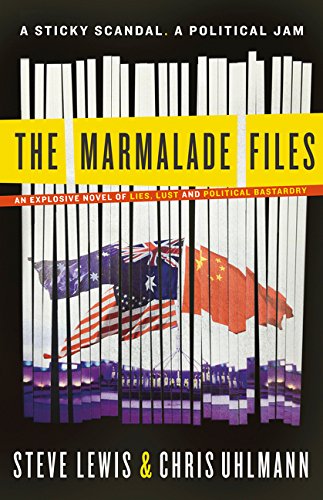The Marmalade Files
by Chris Uhlmann and Steve Lewis
Harper Collins, 2012, 320 pages
 Australians don't normally do satire. We're not quite serious enough. That indispensable The Penguin Dictionary of Literary Terms and Literary Theory helpfully points out that Samuel Johnson defined "satire" as a poem "in which wickedness or folly is censured". John Dryden believed the purpose of satire was "the amendment of vices" and Daniel Defoe thought satire should bring about "reformation".
Australians don't normally do satire. We're not quite serious enough. That indispensable The Penguin Dictionary of Literary Terms and Literary Theory helpfully points out that Samuel Johnson defined "satire" as a poem "in which wickedness or folly is censured". John Dryden believed the purpose of satire was "the amendment of vices" and Daniel Defoe thought satire should bring about "reformation".
According to the Penguin Dictionary the satirist is "a kind of self-appointed guardian of standards, ideals and truth; of moral as well as aesthetic values". In the end "satire is a kind of protest, a sublimation and refinement of anger and indignation."
It's hard to imagine a better subject for satire than federal politics in Australia. And there have been few better books about Australian politics than The Marmalade Files by Chris Uhlmann and Steve Lewis. Uhlmann is the political editor of the ABC's 7.30. He's also the country's best interviewer. Steve Lewis has been a journalist at the Australian Financial Review, The Australian, and he's now the national political correspondent for News Limited's metropolitan dailies. Together they've had nearly half a century reporting on federal politics ― longer if reporting on Kevin Rudd as prime minister counts double compared to reporting on any normal PM. They've covered all the recent and exciting bits of Canberra politics, particularly the Rudd/Gillard/Greens/minority government saga.
The book hits the mark. It's funny and sometimes very funny. And sometimes it's uncomfortable in the way that watching Yes Minister or The Office is uncomfortable. The Marmalade Files succeeds because it could almost be a work of a fact, which is what makes it so effective. The plot is outlandish but not so outlandish such that it would be impossible to claim what's described could never ever happen.
 The book is self-described as "an explosive novel of lies, lust and political bastardry". Harry Dunkley, "a press gallery veteran with an instinct for trouble", receives an anonymous tip-off about a corrupt politician. As he hunts down the story and the web of intrigue that inevitably follows anonymous tip-offs, Harry confronts trade union thugs, obstreperous and self-important ministerial advisers, and the national security establishment. And around Harry's story Uhlmann and Lewis weave a cast of characters and present some brilliant cameos. There's the breakfast TV program the Morning Glory and its hosts Thommo and Janny. There's the Greens leader on Q&A who, amid delirious cheers from the live audience, proclaims "we must de-industrialise and de-capitalise" and "ending the enslavement of non-human animals is the next great liberation. We humans are only a small part of Gaia."
The book is self-described as "an explosive novel of lies, lust and political bastardry". Harry Dunkley, "a press gallery veteran with an instinct for trouble", receives an anonymous tip-off about a corrupt politician. As he hunts down the story and the web of intrigue that inevitably follows anonymous tip-offs, Harry confronts trade union thugs, obstreperous and self-important ministerial advisers, and the national security establishment. And around Harry's story Uhlmann and Lewis weave a cast of characters and present some brilliant cameos. There's the breakfast TV program the Morning Glory and its hosts Thommo and Janny. There's the Greens leader on Q&A who, amid delirious cheers from the live audience, proclaims "we must de-industrialise and de-capitalise" and "ending the enslavement of non-human animals is the next great liberation. We humans are only a small part of Gaia."
There's GetSet! the online campaigning organisation ― "members could log into the state-of-the-art website, sign a petition on anything from live exports to climate change, watch their name and their issue appear on the front page, and then log off and get on with their day ... Activism and outrage now came free, with minimal effort and instantaneous gratification."
And then there's the politicians. Not all of the politicians in the book are grasping, foul-mouthed, media-obsessed egomaniacs ― but most of them are. Uhlmann and Lewis have got the process of modern-day politics in Australia pretty accurate. The politicians no longer preside over the process, they are merely part of it.
Someone wanting to find out about early Georgian politics in England will learn more from looking at Hogarth's pictures and from reading Swift's Gulliver's Travels. Likewise someone seeking an understanding of what happens in Parliament House in Canberra, and what passes between the media and politicians could well start with The Marmalade Files.
No comments:
Post a Comment